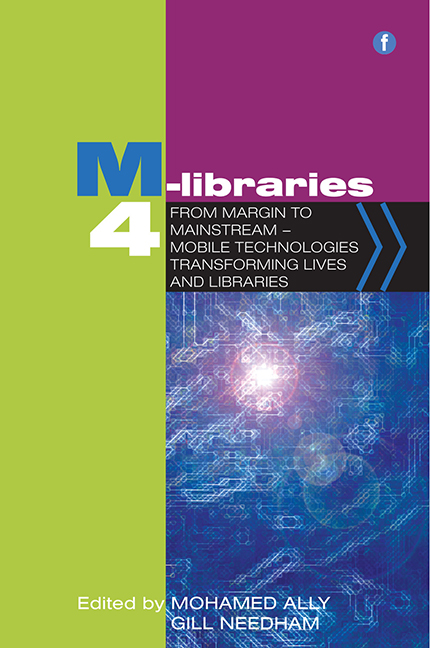18 - Mobile phone technology in academic library services: a public university student’s perceptions and paradigm
Published online by Cambridge University Press: 10 September 2022
Summary
Introduction
At Dhaka University, changes in society and technology have resulted in changes in the students’ use of technology and in their views and attitudes towards using libraries. In this context, new means of communication are necessary in order to keep in touch with library users. New technologies have made communication and access to information very convenient for users, both from the comfort of their own home or office and from wherever they are while on the move with their mobile phones or personal digital assistants (Karim, Darus and Hussin, 2005). The use of mobile technology is increasing, especially in the Asian countries such as Bangladesh. Bangladesh is one of the few countries in the world that can guarantee that every one of its residents can get a mobile phone signal – no matter where they are in the country, with its population of over 150 million. City Cell was the first mobile phone company in Bangladesh, starting operation in 1996, and the total number of mobile phone subscribers had reached 94.714 million by the end of July 2012 (BTRC, 2012). At present, there are six operators providing mobile phone services in Bangladesh (Table 18.1 on the next page).
Mobile phone applications in education and library services
The widespread use of mobile phone technologies, as compared to the use of personal computers, can be clearly seen across all walks of life in Bangladesh. Their use is also widespread among students in institutions of higher learning. This may provide broad opportunities for institutions and businesses alike to apply the technology for commercial as well as for educational purposes. Mayer (2002) has proposed several steps that institutions can follow to provide SMS services. These steps involve forming a collection of mobile phone numbers, setting up a centralized SMS service centre and sending group SMS via a network. Information services delivered by SMS can be reading lists, lectures, academic schedules, exams, homework reminders and so on. Many higher education institutions in Bangladesh have been providing various mobile-phone based information services. Among them are Dhaka University (DU), Jagannath University (JU), Jahangirnagar University (JU2), Bangladesh University of Engineering and Technology (BUET) and Rajshahi University (RU).
- Type
- Chapter
- Information
- M-Libraries 4From Margin to Mainstream - Mobile Technologies Transforming Lives and Libraries, pp. 165 - 176Publisher: FacetPrint publication year: 2014



